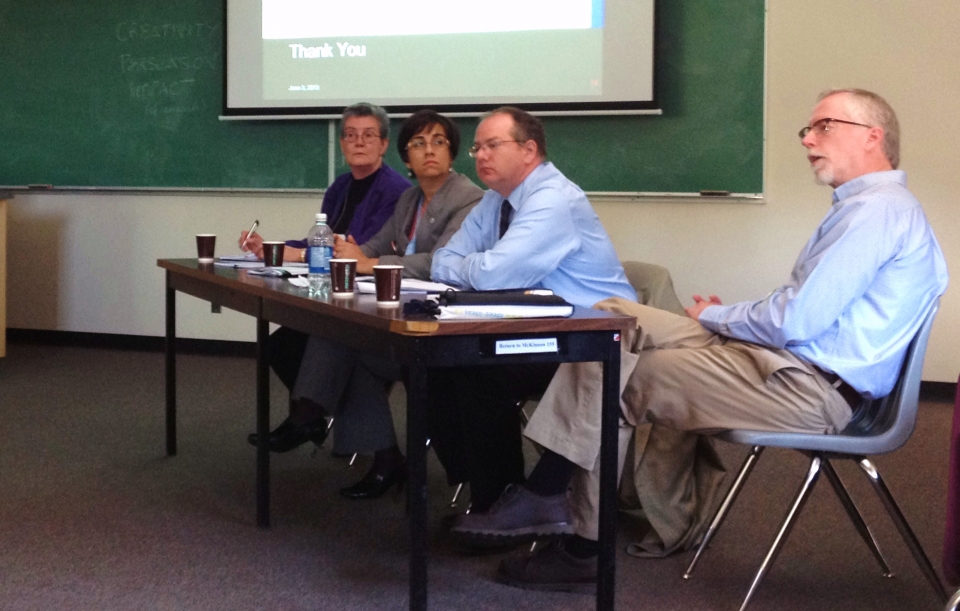Vanessa Hawk
Left to Right: Janet Halliwell, Gisèle Yasmeen, Jean-Francois Fortin, Brian Owen
Open access is increasingly becoming a hot issue for academics, publishers and institutions around the world with the advent of free, online access to research that is destabilizing the way in which research and publications are disseminated and funded.
It is no longer a matter of if, but when open access (OA) policy will be implemented in Canada, as was the consensus at the Open Access Symposium on Monday, June 3.
The first panel, “Funding Sustainable Open Access,” included Gisèle Yasmeen, SSHRC VP Research, Jean-Francois Fortin, SSHRC Director Research Portfolio, Brian Owen, Chair of the CARL/CRKN Open Access Task Force and Janet Halliwell, who is a “rewired, not retired” science and technology policy researcher and independent consultant.
The panel was chaired by Ray Siemens and opened with Andrea Whiteley from the University of Calgary, who presented on open access policy in an international context.
Open access articles can be provided in two ways: through Green self-archiving policy, where authors publish their work in a central or institutional repository; or through open access journals managed by publishers in Gold OA policy.
The majority of universities do not have OA policy. The CARL/CRKN Open Access Task Force chaired by Brian Owen found that there is a lack of policy and digital infrastructure at the national level in Canada. Whiteley said that while OA policies are beginning to crop up in the USA, Australia and the European Union, support for OA in Canada is lacking. Whiteley did note, however, that international examples of OA policies vary between green and gold policies, are not legally binding and struggle with compliance issues.
Representing Canadian researchers, libraries and universities, the panelists each stated that their institutions and organizations need to be proactive in crafting an OA policy before less agreeable policy is inevitably imposed on them by commercial vendors.
SSHRC mandates the promotion of free access and dissemination of Canadian research, but Yasmeen said that Canadian OA must be well-articulated to address issues and debates surrounding the length of embargo periods, the use of repositories and research and publication funding.
Yasmeen confirmed that SSHRC aims to pen a draft OA policy with heavy consultation from the research community. Jean-Francois Fortin added that roughly 20 per cent of peer-reviewed journals in Canada already have open access and a further 27 per cent have installed a moving pay wall. Fortin expects that these numbers will grow exponentially and highlighted that SSHRC has made changes to allow greater flexibility in funding so to be better able to fund the development and maintenance of digital OA infrastructure, among others.
Brian Owen, too, recommended a rapid response to keep pace with changing information systems, technological opportunities for archiving and information systems. Owen and CARL/CRKN speak from the perspective of libraries and librarians. Janet Halliwell observed that many universities consider librarians “second-class citizens” despite that they are well-positioned to drive change and establish OA infrastructure that is highly accessibly, but also financially sustainable.
Halliwell emphasized that coordinating open access in Canada is a shared agenda that should “bring players from across [different] sectors together.”
Several recommendations outlined by Owen echoed this call for collaboration, noting that the CRKN has engaged with commercial vendors to discuss sustainable OA publishing models that benefit both authors and journals, as well as institutions.
More information about open access work SSHRC is doing can be found on their website.

